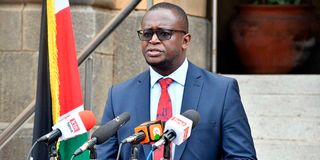Law Society chair accuses DCI, Police of being ‘compromised’

Law Society of Kenya President Eric Theuri addressing the media outside the Supreme Court of Kenya on May 26, 2022.
The Law Society of Kenya (LSK) has become a thorn in President William Ruto’s flesh. The body has openly challenged some of his critical decisions, including appointments to government offices that appear to be in violation of the constitution.
In an interview with Sunday Nation, LSK president Eric Theuri talked of an alleged capture of independent institutions by the Executive. He listed the Judiciary, the National Police Service and the Directorate of Criminal Investigations (DCI) as some of the institutions that appear compromised by the current regime.
He described the decision to allow the recently appointed Chief Administrative Secretaries (CAS) to assume office against a court order as the height of impunity. The society plans to file for contempt. Lawyer Theuri also called out Deputy President Rigathi Gachagua for promoting impunity by defying the court order. He cited an instance when Mr Gachagua ordered for the punishment of former Nakuru county police commander Peter Mwanzo for executing evictions that had been ordered by the court.
Q: What is your view on the ongoing mass action?
A: Every Kenyan has a right under Article 37 to demonstrate and present petitions to any public institution. The attempt by the government to declare those protests illegal has no legal backing. Once the police have been notified of the protests, they should actually provide security to both the protestors and members of the public. Then the protests should proceed in a manner that does not impede other public activities.
The responses to the demonstrations by the police to a certain extent have only triggered violent response from the protestors, leading to a breakdown of law and order. Also, I think the protests have been carried out in a manner that has affected normal public life and activities.
How has the National Police Service handled the protests?
A: There is overwhelming evidence that the police service is no longer independent. It is tied to the executive and is taking illegal orders from the executive. They are discharging their mandate in a highly partisan manner and unless the IG retraces his steps, he is going to take us back to the yester years when the police was not a service but a force. A lot of time, effort and resources have been put to ensure we have an accountable and independent police service. But the current IG is in a mad rush to take us back to years when the police were a tool used to control the opposition or those who are perceived to be anti-government.
Apart from the police, are you worried about other institutions and their independence?
A: I think you get the feeling that some institutions, including the General Police unit and the DCI, are extremely compromised. There is overwhelming evidence that shows they have lost their independence and professionalism.
On the judiciary, the jury is still out. There have been one or two decisions that have been made by them that have tried to challenge government excesses. But the decision that was made by the court that okayed the appointments of Permanent Secretaries was an instance, in my view, when the judges showed lack of courage.
They abdicated their responsibility because the constitution is very clear that for those appointments to be deemed legal, the gender principle must be met and not more than one-third must come from the same gender.
What do you think of the proposal by the Interior ministry to amend the law that protects demonstrations?
A: To suggest that one must seek the consent of those who could be affected by the demos is a non-reasonable restriction on the right to protest. The purpose of notification is for the police to be aware that the protest is going to be held so they can provide security to the protestants and ensure that the protests are carried out in a manner that causes the least disruption to members of the public. You cannot change and place that obligation on the people calling for the protest.
We also saw a suggestion that there might be a fee or a cost charged, which will go towards cleaning up after the protest. All these are limitations that should not be allowed.
We expect that if such a regulation is passed then the courts in Kenya will not hesitate to find those provisions unconstitutional.
But perhaps the provisions that intend to ensure that the demonstrations cause minimum disruptions to members of the public would need to be examined to ensure they don’t limit the right to protest.
Comment on pictures we have seen of Chief Administrative Secretaries (CAS) assuming office and roles despite a court order barring them from doing so…
A: We find those actions extremely regrettable and we will be making an application for contempt at an appropriate time. There are other CASs who have done the right thing by filing a response in court requesting that those orders be set aside so that they can assume office. The courts exercise judicial powers on behalf of the Kenyan people, so it is wrong for someone appointed to public office to turn around and show contempt to the Kenyan people by disregarding court decisions.
That is the height of contempt not only to the courts but also to the Kenyan people. It also sends a very negative message to the international community that we are a country that does not comply with court orders.
The Law Society of Kenya has lost most of the cases it has filed challenging certain decisions by the executive, including appointments. Does that make you feel frustrated?
A: It does not. What it does is that it raises doubts on the courage the judicial officers have to implement the constitution. Secondly, we have to accept that judges can also make wrong decisions.
The other most important thing is that sometimes the principle is much more important than winning or losing. We unsuccessfully challenged the process of public participation regarding the request by the executive to establish the office of the CAS.
But although we lost, we managed to inform Kenyans that the government intended to create 23 positions, and it is on the basis of that information that we have moved to challenge the creation of the 50 offices. We are now questioning how the government established the additional 27 positions.
There is this controversial Privatisation Bill that got the approval of the Cabinet, and which will allow the sale of State agencies without Parliamentary approval. What are some of the risks the country faces if this bill becomes law? There is a huge danger that if the act is passed, public resources or institutions will be plundered.
Parliament should ensure that that there is a higher level of accountability because then questions can be asked and any member of the public who has legitimate concerns about the process, can have an opportunity to bring out their issue. Article 10 of the constitution has now placed public participation at the centre of every decision that is to be made by the government or any other institution. In fact, there have been cases where good decisions have been invalidated by the courts for lack of public participation.
The other question that the executive has not answered is, what is the problem with going to parliament to seek authorisation to sell public resources? What is so difficult that you have to sidestep that particular requirement?
Do you have plans to challenge the Bill?
A: We will, once it is introduced in parliament. We will be urging parliament to reject the bill, or to amend it and retain parliamentary scrutiny and approval for any proposals made for privatisation. In the event that parliament disregards those concerns, we will look at the final bill that will come out and then challenge it in court.
What is your message to the President and those in position of power?
A: I think we really need to depoliticise the management of our public affairs. But most importantly, the President must rise up and become a statesman. He is no longer a politician. He is not a president for those who voted for him only.
He is a President for each and every Kenyan and therefore his primary focus should be the national interests of the Kenyan people as opposed the interests of his political party.
Even in the current scenario, he must rise above petty and partisan positions, look at the Kenyan people, and make decisions that are for the good of this country. I would also want to urge the institution of the presidency to avoid tearing this country along political lines.
We have seen the Deputy President lead in openly defying court orders, when evictions were made based on a court order. The DP gave illegal and unconstitutional orders to have a police officer punished for implementing that court order, and that level of impunity is sending the wrong message to investors, thereby making the country unsafe for all of us. The duo must realise that politics is over. This is the time to build the nation.
How is the society faring under your leadership? Has peace been restored in the boardroom?
A. I think every institution has its ups and downs, just like any enterprise. We have managed to stabilise the law society. The council is working harmoniously with the secretariat. We hope that period of instability is behind us, and we are looking forward to more glory days for the law society.
PS: An LSK meeting ended in chaos in Kwale on Friday, a day after this interview.





